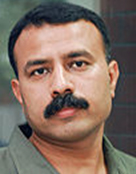1. The Problems of Biological Weapons, Milton Leitenberg, Swedish National Defence College, Department of Security and Strategic Studies, ISBN: 9789189683273, 9189683277 (2004)
2. Biotechnology Research in an Age of Terrorism, Committee on Research Standards and Practices to Prevent the Destructive Application of Biotechnology, National Academic Press, ISBN: 9780309089777, 0309089778 (2004)
3. Popular Reading: A Taste for Poison: Eleven Deadly Molecules and the Killers Who Used Them, Neil Bradbury, St. Martin's Press, ISBN-10: 1250270758 (2022)
4. Popular Reading: Hot Zone, Richard Preston, Anchor, ISBN: 0-385-47956-5 (1994)
5. Measurement, Instrumentation, and Sensors Handbook, Electromagnetic, Optical, Radiation, Chemical, and Biomedical Measurement, Volume 2, Compilers: Halit Eren, John G. Webster; CRC Press (2017)
6. Principles of Instrumental Analysis, Douglas A Skoog, James Holler, Stanley R Crouch, ISBN: 9781337468039, 1337468037 (2017)
7. Instrumentation, Franklyn W Kirk & Nicholas R Rimboi, American Technical Society, ISBN: 9780826934208, 082693420X (1966)
8. Quantitative Chemical Analysis (Edition 8), Daniel C. Harris, Freeman Palgrave Macmillan International Edition, ISBN- 13: 978-1-4292-1815-3 (2010)
9. A Textbook of Quantitative Inorganic Analysis including elementary Instrumental Analysis (Edition 3), Arthur I Vogel, The English Language Book Society & Longmans, Green & Co Ltd (1961)
10. The electrochemical detection of bioterrorism agents: a review of the detection, diagnostics, and implementation of sensors in biosafety programs for Class A bioweapons, Connor O Brien, Kathleen Varty, Anna Ignaszak, Microsystems & Nanoengineering, Volume 7, Article Number: 16 (2021)
11. Nanoelectronics & Nanosystems, From Transistors to Molecular & Quantum Devices, Karl Goes, Peter Glosekotter, Jan Dienstuhl, Springer, ISBN: 3-540-40443-0 (2004)
12. Enabling Technologies for Cultured Neural Networks, Volume 1, Editors: David A. Stenger, Thomas M. McKenna, ISBN: 9780126659702, 0126659702 (1994)
13. Nanobioelectronics - for Electronics, Biology, and Medicine, Editors: Andreas Offenhausser, Andreas Offenhäusser, Ross Rinaldi, Springer, ISBN: 9780387094595, 0387094598 (1979)

DOWNLOAD APP
FOLLOW US